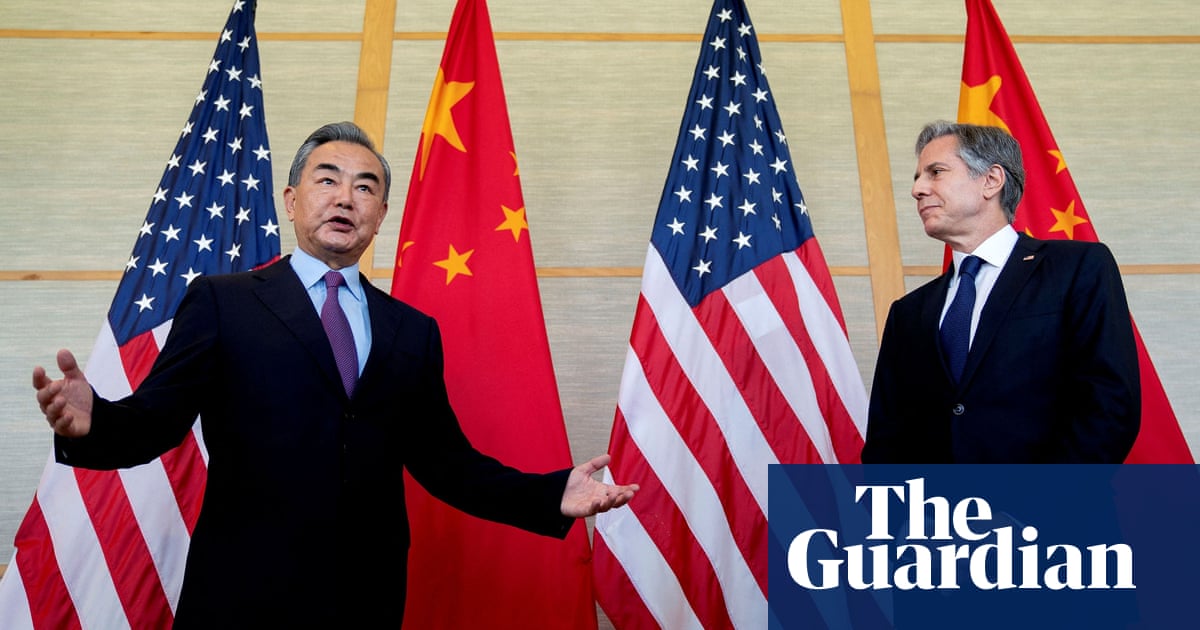
China’s support for Russia’s war in Ukraine is complicating US-Chinese relations at a time when they are already beset by rifts and enmity over numerous other issues, the US secretary of state has told his Chinese counterpart
In five hours of talks in their first face-to-face meeting since October, Antony Blinken said he expressed deep concern to the Chinese foreign minister, Wang Yi, about Beijing’s stance on Russia’s actions in Ukraine and did not believe Beijing’s protestations that it was neutral in the conflict.
The talks had been arranged in a new effort to try to rein in or at least manage the hostility that has come to define recent relations between Washington and Beijing.
“We are concerned about the PRC’s alignment with Russia,” Blinken told reporters after the meeting in the Indonesian resort of Bali. He said it was difficult to be “neutral” in a conflict in which there was a clear aggressor but that even if it were possible: “I don’t believe China is acting in a way that is neutral.”
The Biden administration had hoped that China, with its long history of opposing what it sees as interference in its own internal affairs, would take a similar position with Russia and Ukraine. It has not, however, choosing instead what US officials see as a hybrid position that is damaging the international rules-based order.
Blinken said every nation, China included, stands to lose if that order is eroded.
The two men met a day after they attended a gathering of top diplomats from the G20 that ended without a joint call to end Russia’s war in Ukraine or a plan for how to deal with its impacts on food and energy security.
However, Blinken said he believed Russia had come away isolated and alone from the meeting of rich and large developing countries as most participants expressed opposition to the Ukraine war. However, the ministers were unable to come to a unified G20 call for an end to the conflict.
“There was a strong consensus and Russia was left isolated,” Blinken said of individual condemnations of Russia’s actions from various ministers, some of whom shunned conversations with the Russian foreign minister, Sergei Lavrov.
He noted that Lavrov had left the meeting early, possibly because he did not like what he was hearing from his counterparts.
“It was very important that he heard loudly and clearly from around the world condemnation of Russia’s aggression,” Blinken said. “We see no signs whatsoever that Russia at this point is prepared to engage in diplomacy.”
On China, Blinken said he and Wang discussed a range of contentious issues, from tariffs and trade and human rights to Taiwan and disputes in the South China Sea, that have all been complicated by the Chinese position on Ukraine.
Two days earlier, the countries’ top military officers had faced off over Taiwan during a virtual meeting. Blinken said the self-ruled island that Beijing claims as its territory was just one of a series of problematic issues.
He said he stressed US concerns over China’s “increasingly provocative rhetoric and activity near Taiwan and the vital importance of maintaining peace and stability across the Taiwan strait”. He added that he had also raised human rights concerns regarding minorities in Tibet and in the western Xinjiang region.
Going into the talks, Wang said it was “necessary for the two countries to maintain normal exchanges” and “to work together to ensure that this relationship will continue to move forward along the right track”.
Wang also echoed frequent Chinese lines about remaining committed to the principles of “mutual respect”, “peaceful coexistence” and “win-win cooperation”. That, he said, “serves the interests of the two countries and two peoples. It is also the shared aspiration of the international community.”
US officials had said they did not expect any breakthroughs from Blinken’s talks with Wang, but that they were hopeful the conversation could help keep lines of communication open and create “guardrails” to guide the world’s two largest economies as they navigate increasingly complex and potentially explosive matters.
“We’re committed to managing this relationship, this competition responsibly as the world expects us to do,” Blinken said.
Sign up to First Edition, our free daily newsletter – every weekday morning at 7am BST

